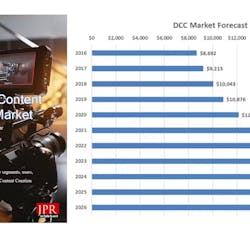According to ABI Research, the over-the-top (OTT) video market will surpass $200 billion by 2024, with 90% of that value fueled by subscription and advertising revenue.
New services like Disney+ and Apple TV+, coupled with aggressive pricing and packaging, and continued expansion by incumbents are driving growth in the subscription video on demand (SVOD) market. Subscriptions in the Asia-Pacific region have grown significantly, driven by key services in China (e.g., iQIYI/Baidu, Tencent, Youku Tudou/Alibaba Group) and increasing opportunities in India. The ongoing shift to OTT is creating value for companies throughout the video value chain, including pay TV operators. The expansion of new technologies, like 5G, is expected to further present the market with new opportunities.
"Cord-cutting is often regarded as a consequence of expanding OTT consumption, but the market dynamics are more complex, particularly when one considers how the pay TV industry has embraced OTT as a complement and value-additive, rather than strict competition. Over time, we expect the traditional pay TV offer to continue to evolve and become indistinguishable from a pure OTT package of services," said Michael Inouye, principal analyst at ABI.
Even with more than 700 million OTT SVOD subscriptions in 2019, the pay TV market, with more than 1 billion subscriptions, is still larger. And, while growth rates are slower (and declining in North America), the overall market is still expanding. The attention paid to low latency video is testament to how OTT video is growing, but also highlights the ongoing opportunities with live/linear programming.
"Increasingly, we're seeing more solutions and conversations about bringing content and services together," Inouye said. "This includes pay TV and OTT bundles and extends to cross-platform advertising, analytics, and customer/service management. Ultimately it makes the market more accessible to a wider range of companies and expands the potential video touchpoints, particularly as new technologies like 5G, smart home, and augmented/virtual reality play larger roles."





